The Winners - Pig & Poultry 2021

Pigs Award

Ben Thompsett,
East Anglia
Of all the farm animals Ben Thompsett could have chosen, pigs were at the bottom of his list.
His first taste of working with animals was at 13 when he helped out a local gamekeeper. Then came more work experience, harvesting on a nearby arable estate.
At 16, Ben went to Easton and Otley College to study gamekeeping. Throughout his time at college, Ben worked on the college farm helping out with dairy and beef cattle.
“When I finished my course,” says Ben “I had a job lined up gamekeeping in Scotland. But then a fellow student told me about a vacancy on an outdoor pig farm locally. I had always regarded pigs as rather noisy and smelly and had no real desire to work with them. How wrong I was".
"That first job completely changed my view. I really came to love them. They are so interesting once you learn to ‘read’ them. So inquisitive and intelligent, especially the piglets”.
Now at the tender age of 23, Ben leads a team of six, managing an RSPCA Assured outdoor breeding unit with 1,500.
“Young stockmen are hard to find”, said Mark Robertson, an RSPCA Assured assessor, “and to see a young British lad so interested in working with pigs, and so willing to learn to be the best he can is great to see. It’s also really pleasing to see people not brought up in agriculture, getting a chance to prove you don’t have to be born into farming to be good at farming”.
What does Ben enjoy the most about his work?
“Doing the best for the pigs. I like to make sure everything on the unit is tip-top and that the pigs are kept to the highest possible welfare standards.”
Does Ben see himself staying with the pigs? “Yes, I can’t imagine working with any other farm animals now. Even when the sun is blazing or the rain is lashing down, I can’t imagine a better career”.
Poultry Award
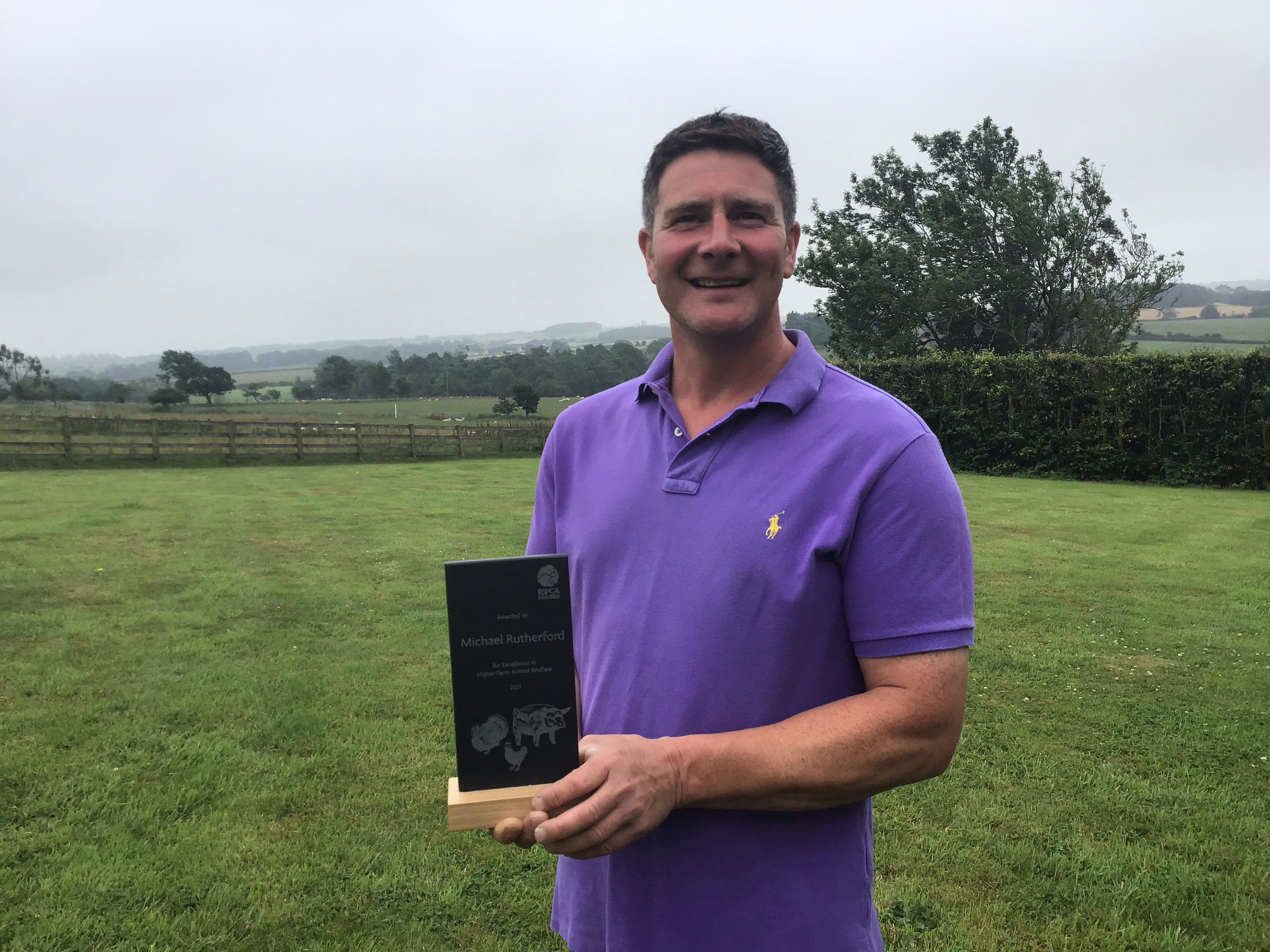
Michael Rutherford,
Morpeth, Northumberland
“They chat to you, they really do!” says Michael Rutherford, who together with his family - his wife, father and brother - runs a farm in Morpeth, Northumberland. That gives you some understanding of the relationship Michael has with his hens.
Sixteen years ago, their family farm was arable, but in 2005, Michael and his brother became really interested in rearing livestock and took the farms back to grass and converted to organic. The farm now boasts 1,900 breeding ewes, a small suckler herd and throughout the year, 2,000 pigs for fattening. In 2016, they added 12,000 laying hens.
The hens on Michael’s farm are not beak trimmed, so it is important to ensure they are well stimulated, so they don’t become aggressive. To prevent this, farmers use environmental enrichment and Michael’s flocks have access to a huge variety. Both inside the shed and outside, you can find pecking blocks, grit placed on the floor or in feeders, or in plastic bottles hung from the ceiling. There are also ropes that hang down with reflective disks, empty bottles or even tennis balls tied to the ends.
Michael aims to have at least a dozen different types of enrichment at any one time, rotating them frequently. This is twice as much as would normally be required by RSPCA welfare standards.
Outside, the range has been planted with trees, providing cover, shelter and shade for the hens and encouraging them to range freely. The grass is kept at different lengths, so the birds have a choice of vegetation and habitat. Branches and dust bathing areas are provided close to the pop holes, along with shelters.
“We invest in good quality litter, ventilation and lighting which all help keep the birds calm and stress-free. Right from the start, we made a decision to produce medium eggs rather than large ones, which are actually more popular. It’s another factor that reduces stress for the hens.
When our new flocks arrive, we spend a lot of time with them, so they get used to us and we can move around and monitor the birds closely without startling them.
It’s more than that, though, “ continues Michael “I find walking through the hen house very therapeutic. They follow you around, pecking gently at your feet, they are so delightfully inquisitive.”
And, of course, there is all that chatting too!

Pigs Award
Poultry Award
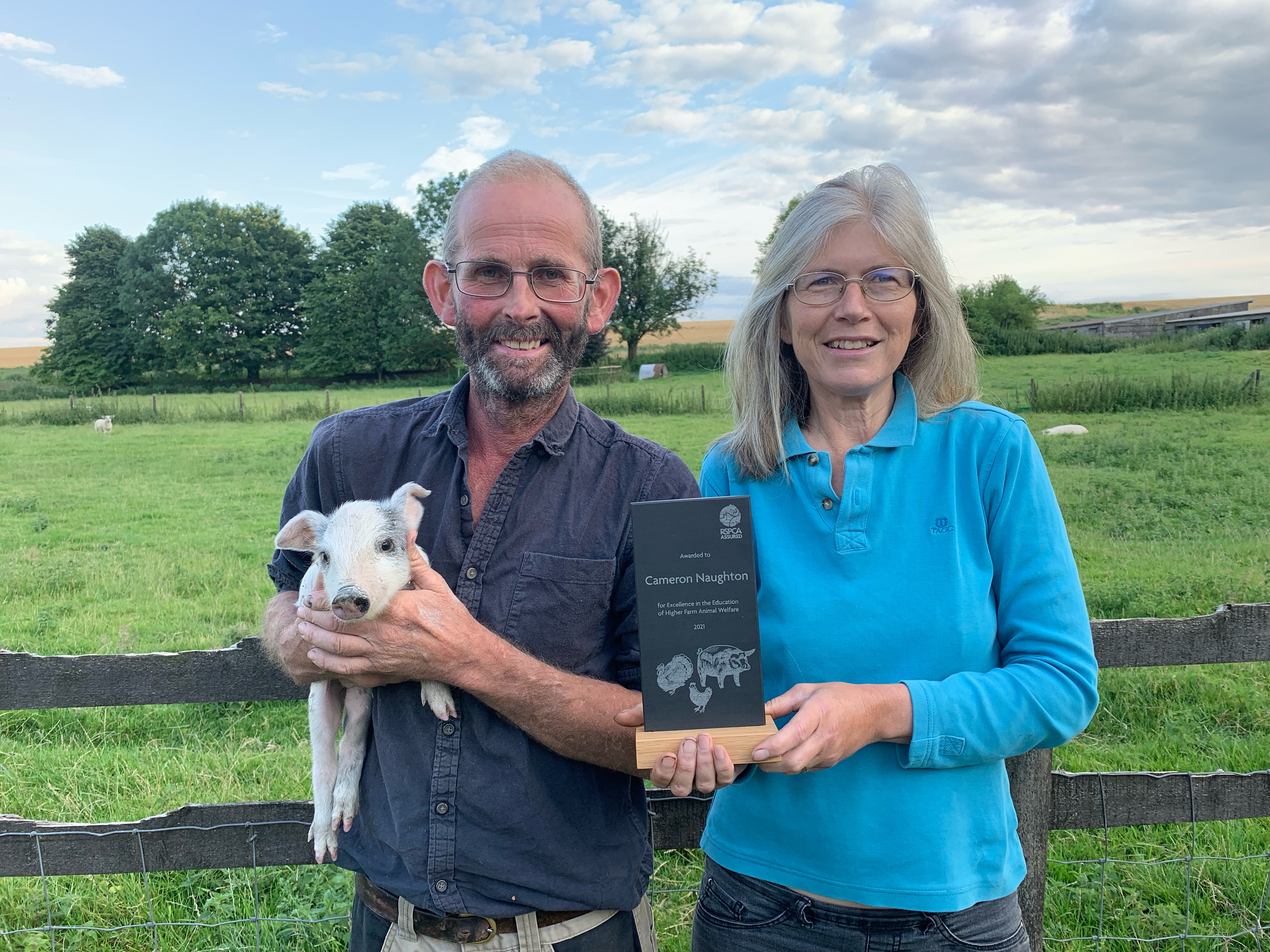
Cameron Naughton, Wiltshire
Army chefs, food technology students, agricultural students from Denmark and Germany, trainee chefs from the UK, church and disability support groups, agricultural teams from Barclays Bank, an MEP and a range of media from Countryfile and Farming Today, local TV and radio, plus the agricultural editor of the Archers. What do they all have in common?
They have all visited West End farm in Wiltshire where Cameron and Muriel Naughton’s 450 breeding sows produce thousands of piglets in the rolling Wiltshire hills.
One of the first members of RSPCA Assured, when it was set up 27 years ago, Cameron’s approach to rearing pigs was inspired by his father who helped pioneer outdoor pig breeding in the 1950s. From the start of his farming career, Cameron was determined to rear his pigs to the highest possible welfare standards and show the world what he was doing.
“We often host up to 100 people a year on the farm,” says Cameron. “It’s really important to us that as many people as possible understand and appreciate the benefits of farming animals well. For our customers and their customers, it’s also critical that they see first-hand how we do things here and what a difference it makes. I have often heard that only small farms can provide really high standards of welfare. I want people to see that it is possible for a commercial-scale farm with relatively large numbers of animals to also produce to a high welfare standard.”
And what do the visitors see?
Well-managed paddocks that are frequently rotated, where the pigs can fully express their natural behaviours: rooting in the grass and straw and wallowing in big, natural pools of water.
An explosion of wildlife alongside the pigs, the result of careful paddock management as well as planting pollen nectar mixes, leading to a huge increase in deer, hares, farmland birds, along with a carpet of wildflowers attracting masses of bees and pollinators
“We also aim to show every stage of the life of our pigs and the way in which they are integrated into the different enterprises on the farm, with the arable side of our operation providing the straw and our grain milled on farm for their feed”, Cameron says.
And while visitors may not see this element, Cameron is particularly proud that he managed to persuade a local abattoir to join RSPCA Assured.
“My pigs now only have to travel a very short distance. This is really important to me because long journeys can be stressful. I know my animals enjoy the best life possible on my farm, but their welfare needs don’t stop when they leave for the abattoir.”
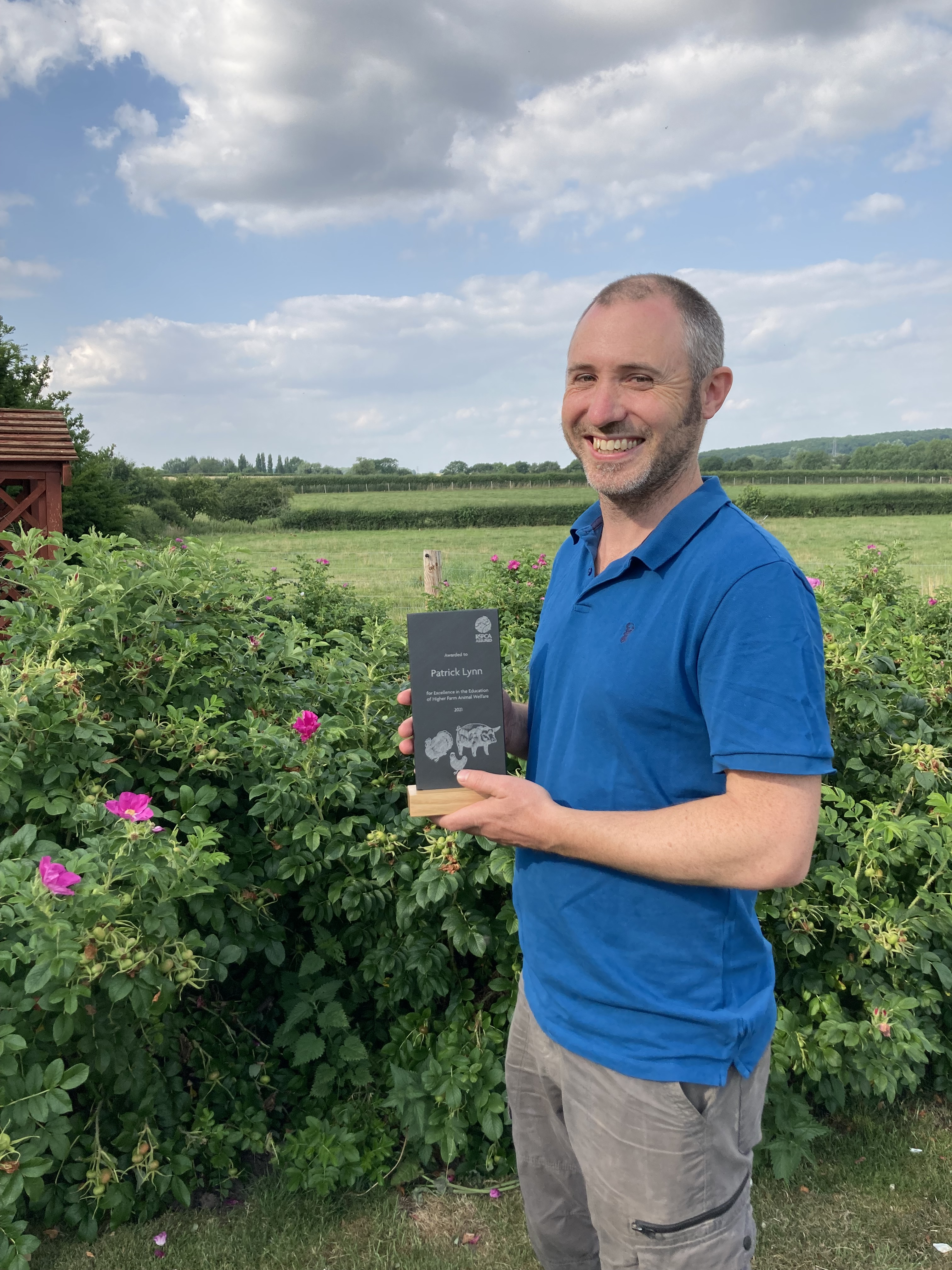
Patrick Lynn - Nottinghamshire
Dear farmer Patrick,
Thank you for inviting us to your farm. My favourite part was looking at the chickins because they were funny! I learnt that chickins make different noises of how they feel! What I found most interesting is the egg machine. Other schools should go there because it’s great.
Love from Edward
That’s one of the many letters Patrick Lynn and his wife Esther get from the children who visit their Nottinghamshire farm.
“The farm has been in my family for nearly a century,” says Patrick. “It was originally a traditional arable farm, although we had some cattle. Then in 2010, we decided to move into egg production. Today, we have a free-range flock of 43,000 hens"
"It was our children who inspired us to reach out to the local community. We started a programme of going into local schools to talk about our hens. Then we invited infant and primary schools, and Beaver groups to the farm to see how the whole operation worked”.
Before Covid in 2019, the farm hosted visits from around 100 people over the year.
“Lots of local children”, says Patrick “But overseas visitors as well.
“Most recently, we had 20 agricultural students from China. It was organised through Nottingham Trent University. They were fascinated to see how the operation works and how you can maintain high welfare for the birds whilst allowing them to range”.
The ranges at Patrick and Esther’s farm are planted with hundreds of native trees and more recently 500 cider apple trees which supply a local craft cider business.
“Laying hens are descended from jungle fowl,” says Patrick. “Their natural habitat is the jungle floor, so shade and shelter are really important for their well-being.
We have planted lots of hedgerows too, providing what I like to call ‘little motorways for hens’ alongside them!”
Inside the sheds, Patrick is keen to provide the best environmental enrichment possible to keep the birds stimulated and active. He has experimented with many types of enrichment and finds that anything red made from plastic works particularly well. So visitors are likely to see red watering cans or drums suspended on ropes from the roof of the hen houses or scattered amongst the bales of straw.
“As a family, we are very proud of what we have achieved here and are keen to share what we have learned about looking after hens to higher welfare standards with as many people as possible. Covid has, of course, curtailed what we can now do but we are actively looking at how we can continue to educate and inform people online”.

Pigs Award
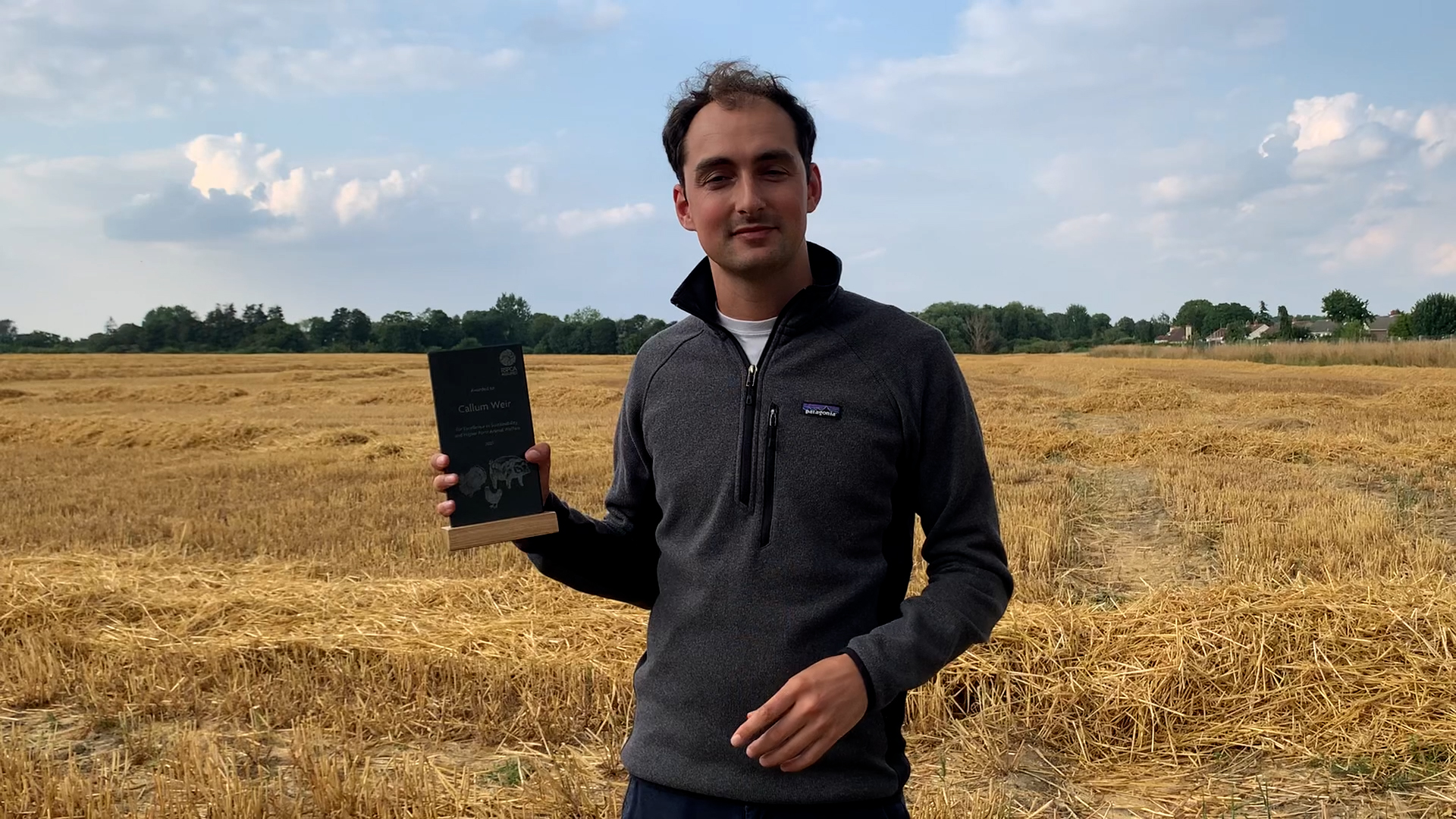
Callum Weir,
(formerly of) Wimpole Home Farm, Cambs
“£20 for every worm you find”, was what Richard Morris, the then farm manager, was offering ten years ago at Wimpole Home Farm. And with the tired and lifeless soil he inherited, he was sure he wasn’t going to be paying out a penny.
Fast forward ten years and the average is now nine worms per spadeful.
“What we’ve achieved at Wimpole”, farm manager Callum Weir says, “shows that it is possible to bring about significant change in restoring the natural environment. In the first five years since we started organic farming, the mass of carbon stored in the soils at Wimpole increased by 10%, and the estate has shifted from a net source of greenhouse emissions to a net sink.”
Callum started work experience at Wimpole when he was a teenager with aspirations of becoming a politician, but was soon deterred by the expenses scandal of 2009. His time at Wimpole was an eye-opener for Callum as he realised the possibilities of a career in agriculture. So after a degree at Nottingham University and 3 years with agribusiness Cargill, Callum returned to Wimpole as manager.
“We wanted to demonstrate sustainable farming to the public, to politicians, to civil servants, to industry leaders and to the wider farming community”, Callum says. And that’s just what they did, Callum with his dedicated team of seven, backed by 60 volunteers.
Wimpole Home Farm now sees about 350,000 visitors a year, all wanting to know more about how their food is produced. “Our high welfare reared livestock are perfect for promoting the recovery of wildflowers in our 500 acres of Grade 1 listed parkland and hay meadows, as well as building fertility and soil health in the 1000 acres given over to organic arable farming”
Does the £20 offer to find a worm still stand?
“No”, laughs Callum “the challenge now would be not to find one”.
Callum has now moved on to the WWF as a Sustainable Agriculture Specialist. “Thanks to Wimpole, I’ve learnt so much about how sustainable farming can restore nature and help protect us all against climate change, whilst at the same time being profitable and producing food. In my new role, I help WWF promote this message to a large platform of supporters, policymakers and businesses”
Poultry Award
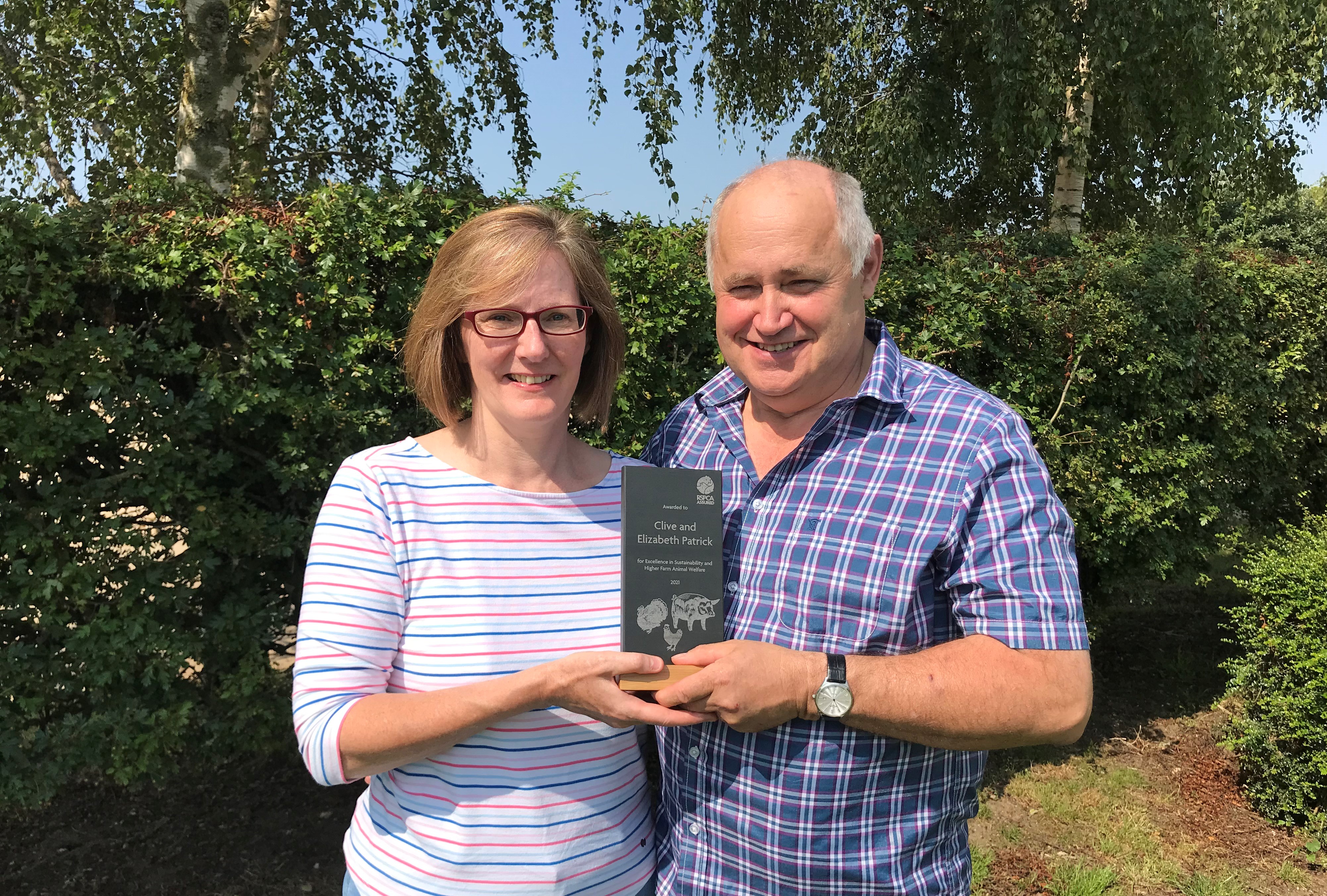
Clive and Elizabeth Patrick,
Lincolnshire
“Want to know why you never see hares in the countryside anymore?” Clive Patrick asks “Because they’re all in our garden, that’s why”.
This abundance of hares on the farm he runs with his wife, Elizabeth is most likely due to the zero tillage that Elizabeth’s father began twenty years ago. Zero tillage is at the heart of conservation agriculture and results in improved soil with less compaction, allowing for much better drainage. There is also an increase in retention of organic matter and worm life and reduced greenhouse gas emissions.
This approach to soil management including the overwintering of stubble, also makes for an attractive habitat for wildlife.
The family’s 650-acre farm supports a herd of fifty cattle for fattening, in addition to fields dedicated to wheat, beans and oats.
Ten years ago, the couple saw a laying hen operation on a neighbouring farm and decided it would be an ideal addition to theirs, and one which they could run entirely themselves. So, not long after, 16,000 laying hens arrived on the farm.
“I love our hens,” says Elizabeth. “They’ve helped us continue our quest for a sustainable farm. All their manure goes back onto the fields and in turn, the enriched soil, full of plump worms, is great for the birds, encouraging extensive-ranging”.
Routine is the best way to keep the birds calm and settled, so Clive and Elizabeth make sure they stick to theirs. They have invested in enrichment in the hen house which keeps their hens stimulated. And out on the range, in addition to trees, they have made little tunnels and shelters to encourage the birds to feel confident leaving the house.
“We operate an ‘open farm’ where we encourage students from several universities, including Durham, Harper Adams, Reading and Bristol, to carry out research studies,” says Elizabeth. “Recent results have shown extraordinary levels of worm count and improved infiltration, compared to what might be found with traditional farming methods”.
Clive says: “We have also seen an explosion of wildlife including lapwings, an abundance of owls – yes, and all those hares in our back garden!”

Mark Jagger, East Anglia
“Go on then, pick up a shovel”, said the dairy farmer to the eight-year-old son of a Parish priest one day in the Yorkshire Dales. It was the first step on a journey that Mark Jagger would take into agriculture, as he made his way through dairy, cattle, sheep and ultimately to pigs.
“The farmer also owned the local pub,” says Mark. “He used to pay me with small bottles of Coca-Cola. Back then it was the only place you could get it”.

Mark moved to North Wales at the age of 13 and was desperate to get back onto a farm. A local farmer, John Wrench OBE, took him under his wing to work as a stockman.
“John was my earliest mentor. He taught me that good stockmanship is all about observing animals closely. We worked with sheep, dairy and beef cattle. John’s mantra was "A happy animal is a healthy animal, and a healthy animal will grow and earn you money”.
Fast forward four decades and Mark now works for British Quality Pigs (BQP).
“Pigs weren’t on my agenda when I started,” says Mark. “It was only through force of circumstances that I ended up in pig farming. But I am so glad I did”.
Mark's passion for pigs and pig farming is now recognised and appreciated throughout the industry. Dedicated to pig welfare, he styles himself as “the voice of the pig” and never tires of helping to promote the adoption of systems that benefit both health and welfare.
One such system is even known as ‘The Jags’. Mark was aware that the system used, by many farmers, for delivering water to pigs was not ideal. The pigs’ access water was through a nipple drinker that could dispense around two pints of water a minute, coming out at a considerable force.
“The pigs can’t take on that much water so quickly”, said Mark “and there was a huge amount of wastage with the water getting into the pen. That’s not good from a health point of view either”.
Mark spent a long time pondering the problem and trying to come up with a better system for water delivery. Then it hit him. “I was in the men’s urinal at the Norfolk Show and I had a eureka moment. By building a urinal-like trough, with delivery nipples above it, we could give the pigs water at the point of drinking with no wastage”.
By solving the problem of how water was delivered to the pigs out of the way, Mark focused on water quality. “We started to look at the header tanks and the water lines that feed into the drinkers. I was a little shocked to see what a poor state they were in and how bad the water quality was.
"So it was back to the drawing board and eventually, we found a water dosing system that could deliver a sanitiser that kills all the nasty bacteria and keeps the water lines clear of sludge and algae. Now the water the pigs drink is as good as Buxton Spring and I’d be happy to drink it myself. I have”.
Pioneering clean water for pigs is an ongoing passion for Mark. But not just for the farmers who rear pigs for BQP.
“The pig industry is very close-knit”, Mark says. “My argument is that anything we develop that is good for the health and welfare of our pigs should be shared with our neighbours, giving them the tools to help improve the health of their herds too. We all benefit in the end”.

Winner of the Outstanding Contribution to Poultry Welfare Award
Roger Gill - Lakes Free Range, Cumbria
“You look after her and she will look after you,” says Roger Gill, Agriculture Director at The Lakes Free Range Egg Company. It’s an attitude that guides Roger and his whole ethos to farming.
Roger started his career in dairy farming but quickly moved into poultry. Initially, he gained experience with commercial broilers, followed by poultry managed organically – including meat chickens, turkeys, breeders, ducks and laying hens. In 2009, he joined Lakes Free Range Egg Company.

At that time, the business had around 500,000 laying hens on contract producer farms and on Lakes own home farms. Over the next eleven years, the business grew. Now the group has more than 1.8 million birds.
CEO of Lakes Free Range, David Brass says: “In his time with us, Roger has been instrumental in turning scientific research into commercially viable high welfare systems. One example is the ‘Dark Brooding’ system, where pullets are much more active and better feathered, whilst reducing rearing mortality by 60% and energy use by 85%.
“Invariably Roger goes that extra mile. He has an insatiable appetite to improve the lives of the birds, treading a fine line between better physical performance, better welfare and economic performance.”
The Lakes have also pioneered the planting of trees on their ranges. Two hundred and thirty thousand trees have been planted over an area of over 6,000 acres. Many of these trees are now maturing, absorbing CO2 and reducing the Lakes' carbon footprint.
Roger says: “I joined Lakes knowing I’d be working with a business that shared my vision. And that was to be the best, to produce sustainably and to meet high welfare standards.”
“After years of working with poultry, I’ve learnt that every day is a ‘school day’. So, I make sure I keep an open mind and constantly challenge why and how we do things.”

